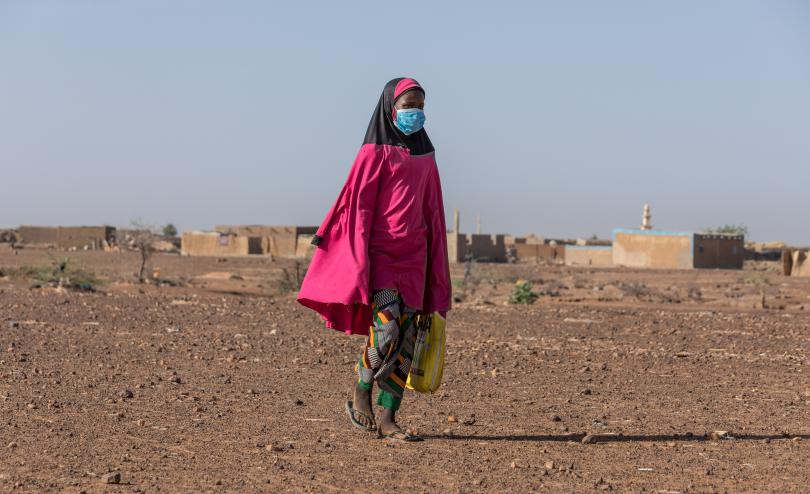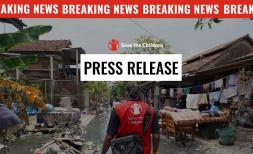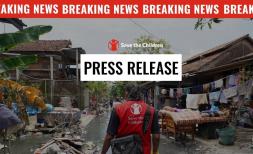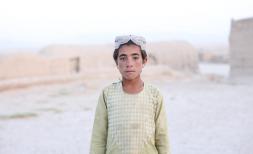FIVE-FOLD INCREASE IN CHILDREN UPROOTED BY VIOLENCE IN WEST AFRICA’S CENTRAL SAHEL

Photo: Apsatou Bagaya / Save the Children
BAMAKO/ NIAMEY/ OUAGADOUGOU, 21 March 2024 -- Escalating violence has led to a five-fold surge in the number of children forced from their homes over the past five years in three west African countries, according to new Save the Children analysis.
The child rights agency analysed figures from the UN High Commissioner for Refugees (UNHCR), national governments and the UN’s International Organization for Migration (IOM) [1] to calculate the number of children displaced in Mali, Burkina Faso and Niger over the past five years. The analysis revealed that the number of children forced to flee their homes has surged from around 321,000 in 2019 to around 1.8 million today. Since the start of 2023, some 53,000 children have been forced to leave their homes in these countries.
Most of the children displaced – around nine in ten - have remained within their national borders, placing additional strains on cities' and communities' already stretched resources.
In addition, Côte d’Ivoire, which emerged from its own civil conflict in 2011, has also been affected by the spillover of conflict in the central Sahel. Conflict in neighboring Burkina Faso and Mali has led to a twelve-fold increase in children seeking refuge in the country, numbering around 2,450 at the end of 2022 and around 29,700 currently. [2]
Vishna Shah, Regional Director of Advocacy and Campaigns for Save the Children said:
“The largely forgotten crisis in the central Sahel remains one of the worst humanitarian emergencies in the world, made even more devastating by the fact that this is a children’s crisis hitting one of the youngest populations in the world. Millions of children are living in displacement fleeing from unimaginable deadly violence. These children were already living in one of the most challenging places to grow up in the world before losing their homes, their communities and everything that they knew.
In addition to increased funding, Save the Children is calling on the governments to protect civilians during conflict, with a special focus on children. International rules and standards must be adhered to so as to reduce the impact of the violence on the children and their families.”
Children make up 40% of the world’s displaced people according to the UN [4], however, they account for an even bigger share of those forced to flee their homes in west and central Africa, making up around 58% of people forced to flee in the countries included in our analysis [3].
The central Sahel countries of Burkina Faso, Mali and Niger have been wracked by years of conflict, coups d'état, extreme poverty and rising food insecurity. It is also one of the regions on the frontline of the climate crisis. Children face threats including violent attacks and the risk of recruitment by armed groups as more than a decade on from the start of the crisis which began in Mali in 2012, the situation has continued to deteriorate. Grave violations against children in conflict which include killing and maiming, abduction and recruitment of children into armed groups or as soldiers have increased in recent years, particularly in Mali [4]. In November, in Burkina Faso meanwhile at least 70 civilians - mostly children and elderly people - were massacred [5].
Salamatou*, aged 11, from the Tillaberi region of Niger was forced to flee her home due to violence and lives in a camp for internally displaced children 50km away from her village. Over 800 schools remain closed in Tillaberi due to insecurity according to government data [6]. She attends an education class set up Save the Children at a school near the camp.
“In the camp, I'm really scared because my father was killed, but at school I find comfort in playing with my friends. I miss my father and friends from my village.”
Save the Children supports displaced children around the world to give them the vital supplies they need to survive and the things you can’t put in a bag - security, education, shelter, health, a place to play, laugh and learn, and someone to fight for their rights. The child rights organisation is working to support refugees and people displaced within their own countries and provide protection and support services at borders to help people settle as they arrive at new places.
In Niger, Save the Children provides long-term development programmes and emergency-life-saving interventions across a diversity of sectors in Niger. This work spans child protection, health, nutrition, food security and livelihoods, education, water and sanitation and hygiene and in 2023 our programmes helped 2.8 million people in the country including 2.1 million children.
Notes to editors:
[3] Based on an average of the child shares reported for the various countries internally and displaced populations as per reports from governments, the IOM and UNHCR.
*Name changed.
*************************************************************************************
For further enquiries please contact:
Kunle Olawoyin kunle.olawoyin@savethechildren.org
Aisha Majid, aisha.majid@savethechildren.org
We have spokespeople available in the region.
Our media out of hours (BST) contact is media@savethechildren.org.uk / +44(0)7831 650409
Please also check our Twitter account @Save_GlobalNews for news alerts, quotes, statements and location Vlogs




